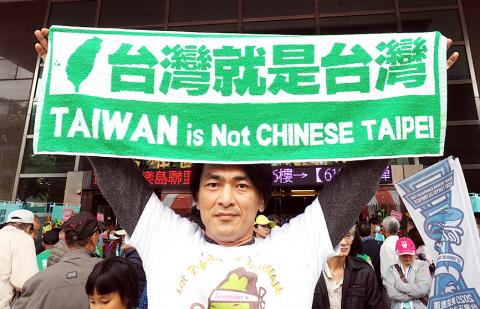Groups participating in international events should avoid using the name “Chinese Taipei,” which could be twisted to mean that Taipei is a part of China, the Ministry of Foreign Affairs said.
In guidelines published on Monday last week, the ministry said non-governmental organizations (NGOs) should prioritize using the nation’s official title, the Republic of China, or use the name “Republic of China (Taiwan)” when participating in international events.
The name “Taiwan” is also acceptable in circumstances under which the official title cannot be used, the ministry said.

Photo: EPA-EFE / DAVID CHANG
Titles that demote the nation’s status — such as “Taiwan, Province of China,” “Taiwan, China,” “Taipei, China” or “Chinese Taiwan” — are unacceptable, it said.
If NGOs are unable to use the preferred titles, they could recommend that event organizers refer to all participating nations, teams or groups with the names of their cities or organizations, it added.
The use of the name “Chinese Taipei” should also be avoided due to Beijing’s efforts to promote it as Zhongguo Taibei (“China Taipei,” 中國台北) in Mandarin, the ministry said.
If NGOs must use the name “Chinese Taipei” as their membership name, they should endeavor to refute or prevent the distortion of the name into “China Taipei” in Mandarin, it said, adding that “Chinese Taipei” should be listed under the letter “T” instead of the letter “C.”
While the guidelines mainly target registered NGOs participating in events abroad with help or financial support from the government, they could also apply to NGOs not partnered with the government that have been suppressed due to their membership names, the ministry said.
Taiwanese NGOs participate in international events, but due to Taiwan’s special diplomatic circumstances, they often face Chinese suppression, ministry spokesman Andrew Lee (李憲章) said.
The guidelines were prepared by the ministry along with other government agencies to provide NGOs with guidance and prevent the nation’s status being degraded or the NGOs’ participation rights being violated, he said.
The guidelines serve as a reference for NGOs, Lee added.
The ministry had previously set internal guidelines to help NGOs maintain their membership at international organizations, he said, adding that those guidelines, as well as the preferred titles for the nation, have been in place for years.
In 1993, the ministry issued a set of guidelines for civil servants participating in international conferences or events at which Chinese Communist Party members would also be present.
The guidelines list “Taiwan” and “China Taiwan” as “inappropriate titles” for the nation.

Seventy percent of middle and elementary schools now conduct English classes entirely in English, the Ministry of Education said, as it encourages schools nationwide to adopt this practice Minister of Education (MOE) Cheng Ying-yao (鄭英耀) is scheduled to present a report on the government’s bilingual education policy to the Legislative Yuan’s Education and Culture Committee today. The report would outline strategies aimed at expanding access to education, reducing regional disparities and improving talent cultivation. Implementation of bilingual education policies has varied across local governments, occasionally drawing public criticism. For example, some schools have required teachers of non-English subjects to pass English proficiency

‘FORM OF PROTEST’: The German Institute Taipei said it was ‘shocked’ to see Nazi symbolism used in connection with political aims as it condemned the incident Sung Chien-liang (宋建樑), who led efforts to recall Democratic Progressive Party (DPP) Legislator Lee Kun-cheng (李坤城), was released on bail of NT$80,000 yesterday amid an outcry over a Nazi armband he wore to questioning the night before. Sung arrived at the New Taipei City District Prosecutors’ Office for questioning in a recall petition forgery case on Tuesday night wearing a red armband bearing a swastika, carrying a copy of Adolf Hitler’s Mein Kampf and giving a Nazi salute. Sung left the building at 1:15am without the armband and apparently covering the book with a coat. This is a serious international scandal and Chinese

TRADE: The premier pledged safeguards on ‘Made in Taiwan’ labeling, anti-dumping measures and stricter export controls to strengthen its position in trade talks Products labeled “made in Taiwan” must be genuinely made in Taiwan, Premier Cho Jung-tai (卓榮泰) said yesterday, vowing to enforce strict safeguards against “origin laundering” and initiate anti-dumping investigations to prevent China dumping its products in Taiwan. Cho made the remarks in a discussion session with representatives from industries in Kaohsiung. In response to the US government’s recent announcement of “reciprocal” tariffs on its trading partners, President William Lai (賴清德) and Cho last week began a series of consultations with industry leaders nationwide to gather feedback and address concerns. Taiwanese and US officials held a videoconference on Friday evening to discuss the

PERSONAL DATA: The implicated KMT members allegedly compiled their petitions by copying names from party lists without the consent of the people concerned Judicial authorities searched six locations yesterday and questioned six people, including one elderly Chinese Nationalist Party (KMT) member and five KMT Youth League associates, about alleged signature forgery and fraud relating to their recall efforts against two Democratic Progressive Party (DPP) legislators. After launching a probe into alleged signature forgery and related fraud in the KMT’s recall effort, prosecutors received a number of complaints, including about one petition that had 1,748 signatures of voters whose family members said they had already passed away, and also voters who said they did not approve the use of their name, Taipei Deputy Chief Prosecutor